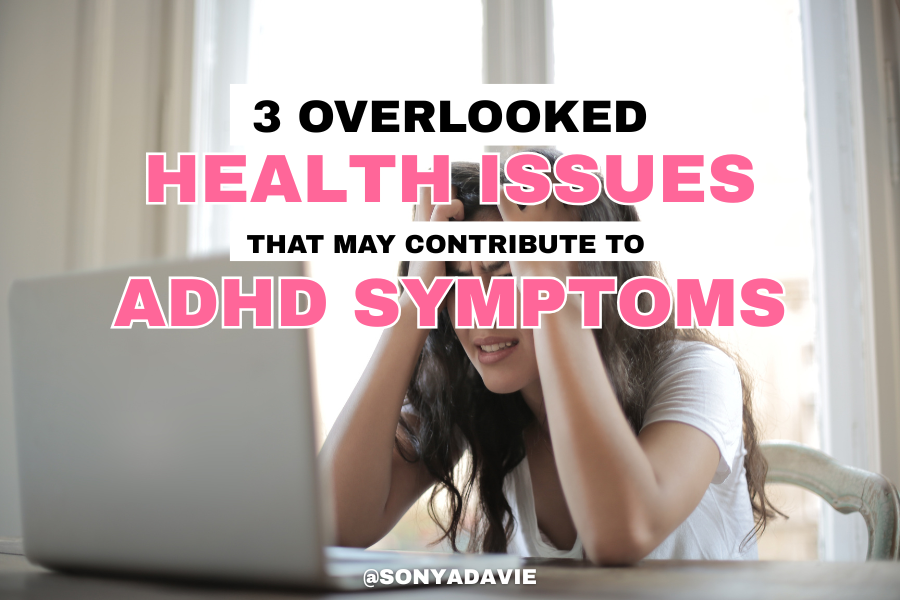When it comes to mental health, Attention-Deficit/Hyperactivity Disorder (ADHD) is often viewed through a very narrow frame: symptom management.

For many, that means medication and maybe a few coping strategies. While these approaches can be helpful, they often leave the deeper “why” unanswered.
Why do symptoms show up in the first place?
What is the body trying to communicate?
And most importantly, what hidden imbalances could be driving the challenges we label as ADHD?
From an integrative and functional psychiatry perspective, ADHD is rarely just a “neurochemical imbalance.”
More often, it’s a signal of underlying biological and environmental disruptions that are asking for attention.
This is a powerful reframe: instead of seeing ADHD as a fixed identity or a lifelong limitation, we can start to view it as a signal… a doorway into uncovering deeper health issues that, once addressed, often bring relief not only for ADHD symptoms but for overall well-being.
As a psychotherapist trained in functional medicine, I’ve seen firsthand how transformational it can be when we move beyond surface-level symptom management and dive into the root causes of what’s truly driving ADHD. My clients who felt stuck or discouraged often experience breakthroughs that medication alone couldn’t provide.

Here are three commonly overlooked health issues that may contribute to ADHD symptoms:
1. Gut-Brain Axis Dysfunction
The gut and brain are in constant communication through the vagus nerve and an intricate web of neurotransmitters and immune signals. This system is often referred to as the “gut-brain axis.”
When it’s disrupted, commonly due to dysbiosis (imbalanced gut microbiota), the result can be leaky gut, chronic inflammation, and altered neurotransmitter production.
Because dopamine and serotonin, key players in attention and mood regulation, are largely produced in the gut, disturbances here can show up as difficulty focusing, impulsivity, or heightened anxiety.
It’s no surprise, then, that many children and adults with ADHD also struggle with digestive issues like bloating, constipation, or food sensitivities.

In fact, recent research has shown reduced gut microbial diversity in people with ADHD, suggesting that an imbalanced gut may directly influence symptoms.
Functional approaches to healing the gut may include:
- Targeted probiotics and prebiotics to restore microbial balance.
- Elimination diets to identify and remove trigger foods.
- Gut-healing protocols with nutrients like L-glutamine, zinc, and collagen to strengthen the gut lining.
When the gut-brain connection is repaired, my clients often notice improvements not just in digestion, but also in mood stability, concentration, and overall calm.
2. Nutrient Deficiencies and Mitochondrial Dysfunction
Our brains are metabolically demanding organs. They require a steady supply of nutrients to fuel neurotransmitter production, support methylation, and keep energy levels steady. Unfortunately, deficiencies are common among people with ADHD.
Key nutrients that are frequently low include:
- Zinc and magnesium, which play roles in dopamine regulation and calming the nervous system.
- Iron, essential for oxygen transport and dopamine production.
- B vitamins, critical for energy metabolism and brain health.
- Omega-3 fatty acids, known for supporting memory, attention, and emotional balance.

On top of nutrient gaps, mitochondrial dysfunction is another overlooked factor.
Mitochondria are the “powerhouses” of our cells, responsible for generating energy. When they aren’t working optimally, the brain may experience reduced energy availability, which can translate into brain fog, poor impulse control, or fatigue that makes focusing nearly impossible.
Functional lab testing can help identify these deficiencies and cellular imbalances.
The encouraging part is that targeted nutritional support, whether through food, high-quality supplements, or lifestyle strategies, can lead to noticeable improvements.
Many of my clients report sharper focus, steadier moods, and greater resilience when their nutrient needs are finally met.
3. Chronic Inflammation and Immune Activation
Inflammation isn’t just a physical issue… it directly impacts the brain. Elevated inflammatory markers can interfere with neurotransmitter signaling, reduce neuroplasticity (the brain’s ability to adapt and learn), and fuel neuroinflammation.
Over time, this ongoing inflammation can worsen ADHD symptoms and even contribute to other psychiatric conditions.

Some often-overlooked triggers of chronic inflammation include:
- Chronic infections, such as Lyme disease or Epstein-Barr virus.
- Mold exposure, which can provoke immune overactivation and neurotoxic effects.
- Autoimmune activity, where the immune system mistakenly attacks the body’s own tissues.
Functional psychiatry aims to identify these hidden drivers.
Anti-inflammatory diets, lifestyle shifts (like better sleep, stress reduction, and movement), and targeted therapies can help lower inflammation and give the brain the breathing room it needs to function more effectively.
When these root causes are addressed, many people experience noticeable improvements in focus, emotional balance, and day-to-day functioning for the first time in years.
Reframing ADHD: From Labels to Root Causes
ADHD is complex, but it’s not a life sentence. An integrative, functional approach asks a simple yet powerful question: why?
Why are these symptoms present, and what’s happening beneath the surface?
By looking beyond the label and exploring gut health, nutrient status, mitochondrial function, and inflammation, we uncover patterns that traditional psychiatry often overlooks.

For some, medication may still play a role, but when paired with functional interventions, the results can be far more sustainable and life-changing.
Many often report not just improved focus, but also increased energy, better sleep, calmer moods, and a renewed sense of vitality that goes beyond managing ADHD symptoms.
✨ If you or a loved one is navigating ADHD, know that there are more answers than you’ve been given.
Exploring the root causes doesn’t just offer hope, it offers a pathway toward lasting wellness and resilience.
+ show Comments
- Hide Comments
add a comment